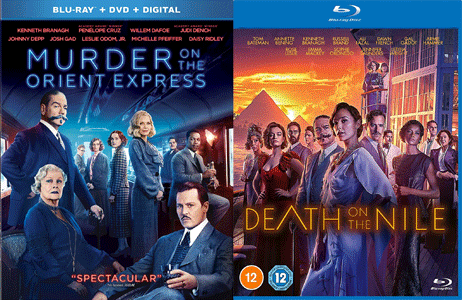Kenneth Branagh’s Hercule Poirot isn’t Agatha Christie’s Poirot nor David Suchet’s Poirot; indeed, he’s not a lot of fans’ Poirot. However, if you’re gonna yet again adapt “Murder on the Orient Express” (2017) and “Death on the Nile” (2022, now on HBO Max and Hulu) – which had respectively been adapted three and two times before in English – you want to do something different.
A harsher world
In terms of raw adjectives, Branagh’s and Christie’s Poirots cross over. In “Nile,” Rosalie (Letitia Wright) calls the Belgian sleuth an “obsessive, vain, smug, lonely for a reason, detestable, tiresome, bombastic, egocentric little freak.”
Granted, that’s mean, even applied to this cinematic Poirot. But more than half of those words apply to Christie’s Poirot – or at least the way observers view him. In the books and the purer adaptations, readers and viewers find Poirot amusing, and other characters find him to be a fascinating oddity.
“Murder on the Orient Express” (2017) and “Death on the Nile” (2022)
Director: Kenneth Branagh
Writer: Michael Green, based on Agatha Christie’s novels
Stars: Kenneth Branagh; Penelope Cruz, Willem Dafoe, Daisy Ridley (“Orient”); Tom Bateman, Annette Bening, Gal Gadot (“Nile”)
Branagh’s Christie-verse is harsher. Likewise, Poirot is tougher on everyone, and he engages in the world in a manner that’s more aggressive than passive.
(SPOILER WARNING.)
Heck, at the end of the first film, Poirot dares the assembled team of murderers to shoot him and dump his body if they want to get away with the crime. And at the end of the second, he pulls a gun on his audience while outlining the string of events and his solution.
A troubled Poirot
The most notable difference between Purist Poirot and Branagh Poirot is the detective’s comfort level in his own skin. In the books, he’s an inveterate but satisfied bachelor. In the films, he’s troubled, having put romance on the back burner after losing the love of his life (Susannah Fielding as Katherine) in flashbacks to a 1910s war in Belgium.
Actor-director Branagh – working from screenplays by Michael Green (“Blade Runner 2049” and recent “BR” comics) — does “troubled Poirot” better than the “A.B.C. Murders” miniseries. That person, played by John Malkovich, doesn’t seem like the iconic sleuth at all.
This Poirot is in the ballpark. He’s younger and more physical (“Orient” almost has action scenes of a sort). His “order and method” about solving crimes is an affectation masking a more emotional personality.
Branagh’s Poirot is prone to the occasional outburst when he sees people breaking the moral rules of “order and method.” Christie was not so open with Poirot’s moral views, often keeping them up her sleeve until the final pages.

Lavish productions
Simply put, if you can accept this new Poirot, you’ll go a long way toward liking these films. He grew on me over the course of watching them (in one sitting), which might be why I liked the second film a little more.
“Nile” has a better, more complex plot – although I might be saying that partly because I didn’t remember it from the book, whereas “Orient’s” solution (they all did it) is so distinct it can’t possibly be forgotten.
The casts of both films read like all-star rosters (consider that Oscar winner Olivia Colman is almost in the background of “Orient”), and both are lavishly shot. “Orient” includes a shot of Poirot walking atop the snow-covered train as he and the officials examine the possibility of someone sneaking aboard. “Nile” is peppered with gorgeous footage of the ship meandering along the river.
Also lavish: Poirot’s mustaches. They are truly magnificent; Branagh has a double-decker thing going, making me understand Christie’s pluralization of the word.
Meanwhile, composer Patrick Doyle’s deep tones suggest it all means something. I suspect this was Green’s goal: to take Christie’s proven plots and archetypes but punch up the events and characters for modern cinematic impact (even though both films take place in the 1930s, same as the books, which came out in ’34 and ’37).
1930s meet the modern age
Christie generally trusted law enforcement (although she sometimes poked fun at them), and most of her main characters were white. These being modern films, the casts are diverse. Black and Middle Eastern characters in each film note that – unless Poirot solves the case – when the train or ship comes into port they’ll be arrested for being a colored person at the scene of a murder.
“Nile’s” Rosie and her aunt Salome (Sophie Okonedo) are black, and Green pens blunt race commentary. Questioned as a suspect by Poirot, Salome says there’d be a whole lot of dead white ladies if she solved all her grievances with her .45. The film also includes a closeted lesbian couple; Branagh’s Poirot ferrets them out – and to his credit is not morally opposed. Christie’s Poirot would not have known gay people existed.
Green’s add-ons don’t distract from the films’ core appeal – the mysteries and the production values – but they strike me as atypical for the time period. There were strong (albeit marginalized) minority people in the 1930s, but would they be so bravely outspoken? To some degree, Green is mashing up true history with newer developments in race relations, doing almost a “Hamilton” thing.
He and Branagh aren’t done yet. A third film is in production, although unlike with “Death on the Nile” (which is bluntly teased at the end of “Murder on the Orient Express”), we don’t yet know what this next sequel will be. But we do know this: Purists can skip it, and those open to Branagh’s version of Poirot can get excited for it.
“Murder on the Orient Express”: 3.5 stars
“Death on the Nile”: 4 stars
Every week, Sleuthing Sunday reviews an Agatha Christie book or adaptation. Click here to visit our Agatha Christie Zone.


Thank you for your honest opinion and the respectful way you convey your disagreement with what Branagh did with the two movies. Whether you agree with the way Branagh did Poirot or not, you still respected his version and gave him a fair review. Thank you for yhat! Not everyone in this group is willing to do that.
Thanks for taking the time to read my review and give me positive feedback, Amy!
Hey! Liked the review and (with a smug tweak of my mustache) I must say you got your Branagh stuff down. I appreciate his take on the stylish sleuth and look forward to more. I do think I liked the first one a little better but I only saw each once. Each film had great, spanning visuals as you mentioned and Poirot handled the crowd/suspects quite nicely. Enjoyed your insight!
Glad you enjoyed the review, Jody! Thanks for reading!